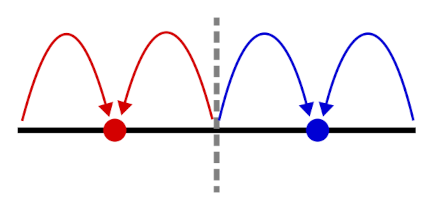Hotelling law
In the begging of XXth century economist Harold Hotelling noted that competitors tend to make their products very similar. Currently this observation is known as minimal differentiation principle or Hotelling law. In order to understand what and why is going on, let us imagine one dimensional city.
Evidently a real-life city can't be one dimensional - we live in three dimensions, thus our cities are also three dimensional. But lets consider this idea as a generalization - a city with a single main street. All houses in this city would be positioned along that main street, there would be no smaller side streets. Let us introduce two competitors into the city - two pharmacies (though the business itself is irrelevant). What would the citizens like? They, of course, would prefer that their shortest path would be as small as possible. Any citizen will prefer pharmacy, which is nearer to him. In order to have the average shortest path to any pharmacy as small as possible we would have to position pharmacies at 1/4 and 3/4 of main streets length. Both pharmacies in this case would have an equal share of customers.

The problem is that business would like to have as large share of customers as possible. Note that any pharmacy may increase its share (and thus decreasing their opponents share) by moving near their competitor, but staying on the city center side. In such case the pharmacy that made a move would now have a share of 75%, while its competitor would have the remaining 25%. The competitor would retaliate by moving nearer the center, effectively taking over a larger share in the market. These "moves" would continue until both pharmacies would end up in the city center. Moving from the city center would only incur losses of market share, thus both competitors would stay put with an equal share of the market. But the positioning of the pharmacies no longer would be efficient from the citizens point of view.
In order to try it out yourself, we invite to become the owner of "red" pharmacy and compete with the "blue" one. You may choose to occupy any cell in our one dimensional city and then the "blue" competitor will retaliate. Note that cells served by the pharmacies have pale backgrounds of the appropriate color. Retaliation of the "blue" competitor is lagged by one second, therefore you should wait a bit before clicking again.
The same ideas applies not only to geographical positions of stores. Same things may be observed in cell phone design and functionality. Most manufacturers produce phones which look much alike as well as provide the same functions, which might not be needed by certain users. Some people don't need GPS, camera (for taking photos) or earphones (for listening to the music), but they will still have to buy phone with these function anyway. Same applies to software (how many clones of Angry birds or Flappy bird have you seen?). Even political debates are the same - no matter the "morals", politicians tend to approach "centristic" political views during debates to appear to be the better option for the most voters.
A great explanation of the Hotelling law is given in the following YouTube video. It discusses both basic premise of Hotelling law and also generalizes it to the political debates.
